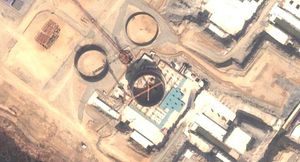North Korea’s test of a long-range ballistic missile last weekend, coming one month after its fourth underground nuclear test, spurred the usual rounds of global condemnation. During the last Republican debate in the United States, candidates took turns calling for expanding missile defense spending and suggesting that it is time for military action against the regime. Senator Ted Cruz linked North Korea with Iran. “The fact that we’re seeing the launch and we’re seeing the launch from a nuclear North Korea is a result of the failures of the first Clinton administration,” Cruz argued. “What we are seeing with North Korea is foreshadowing of where we should be with Iran.”
Cruz’s attack goes to the heart of the debate about Iran’s nuclear program. Critics have consistently argued that Iran, like North Korea, will disregard the nuclear deal and develop nuclear weapons covertly with the help of funding generated by the easing of economic and financial sanctions.
Is Cruz right? Does North Korea foreshadow the inevitable acquisition of nuclear weapons by Iran? Yes and no. On one level, Cruz is absolutely correct to connect the two; there are many similarities between the two situations that do, indeed, suggest that Iran will eventually develop a nuclear weapon. First, both nations are located in historically dangerous neighborhoods and face militarily superior adversaries. In North Korea’s case, South Korea and the United States; in Iran’s case, a Middle East full of Sunni Arabs and a nuclear-armed Israel. From a national security perspective, both countries have obvious reasons for pursuing a nuclear capability.
Second, during the critical nonproliferation policy debates, North Korea and Iran both had an advanced nuclear program, one that was relatively close to being able to develop a weapon. The history of nuclear proliferation suggests that most nations that have abandoned the quest for nuclear weapons have given up early in the process. In contrast, few nations that have gotten as close as North Korea and Iran have forgone the opportunity to do so. Not only are there fewer financial and technical hurdles to manage at that point, but the benefits of going nuclear become much more visible as they get closer. Given this, the level of international effort it takes to prevent further progress toward nuclear weapons grows exponentially.
Third, both North Korea and Iran are difficult to coerce because they are comfortable with their status as “rogue regimes.” Despite regular tongue lashings by the United Nations, neither state worries much about its reputation in the international community. For decades, neither state has responded much to the endless criticism about human rights violations and oppression at home, the sponsorship of terrorism and proliferation abroad, or any number of other issues.
From a policy perspective, however, Cruz is wrong. North Korea’s nuclear program was an unfortunate development but it did not represent a failure of Clinton administration policy; the United States had no reasonable way to prevent North Korea from developing a nuclear weapon. The same holds for Iran. The primary reason for this lies in a final similarity between the two cases: neither one presented the United States with an acceptable military option to prevent proliferation.
Given the strong rationale in both cases for developing nuclear weapons and the advanced state of their programs, the only reasonably sure means of preventing proliferation would have been military intervention on a scale unlikely to be supported by either the American public or the international community.
Moreover, the risks and costs inherent with such large-scale interventions are likely to far outweigh the potential benefits. During the Clinton Administration, policy-makers were not confident that the military could identify and destroy all of North Korea’s nuclear facilities and stocks of plutonium. In addition, North Korea’s ability to launch a massive artillery barrage against Seoul served as a powerful deterrent to U.S. military operations for counterproliferation purposes.
Today, most experts do not believe that bombing alone would do much more than delay Iran’s nuclear program. All of the technical expertise and knowledge – the most precious element of a nuclear program – would remain intact. In the wake of such an attack, Iran’s ambition to develop a deterrent would only be stronger. Meanwhile, the United States could likely expect retaliation through Iran’s sponsorship of terrorism and ability to interfere with shipping on the world’s most important oil supply routes. Nor is invasion and regime change the answer. The thousands of Americans who died during the invasion and occupation of Iraq certainly ensured Saddam Hussein’s Iraq would never acquire nuclear weapons, but the United States also made nuclear weapons more attractive to Iran as a deterrent to future U.S. intervention while at the same time sowing chaos, fueling instability, and opening the door to the Islamic State.
In short, Ted Cruz may be right that the Iran nuclear deal will only delay, not prevent, Iran’s development of nuclear weapons. However, Cruz is wrong to imply that that stronger sanctions or “tougher measures” will do any better. Nor is military intervention worth the certain carnage and potential backlash. Moreover, delaying an Iranian nuclear weapon capability is useful because it gives the United States time to strengthen the nonproliferation regime, to encourage our allies in the region to improve their defensive and deterrent capabilities, and to maintain the international coalition that brought Iran to the negotiating table in the first place.
If the case of North Korea really provides a snapshot of the future with Iran, it reinforces the need for continued engagement to reap the benefits of the deal and continued vigilance to detect, deter, and confront cheating by Iran.
A. Trevor Thrall is senior fellow at the Cato Institute and an Associate Professor in the School of Policy, Government, and International Affairs at George Mason University.
Gregory D. Koblentz is an Associate Professor in the School of Policy, Government, and International Affairs at George Mason University.

































